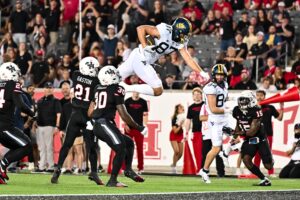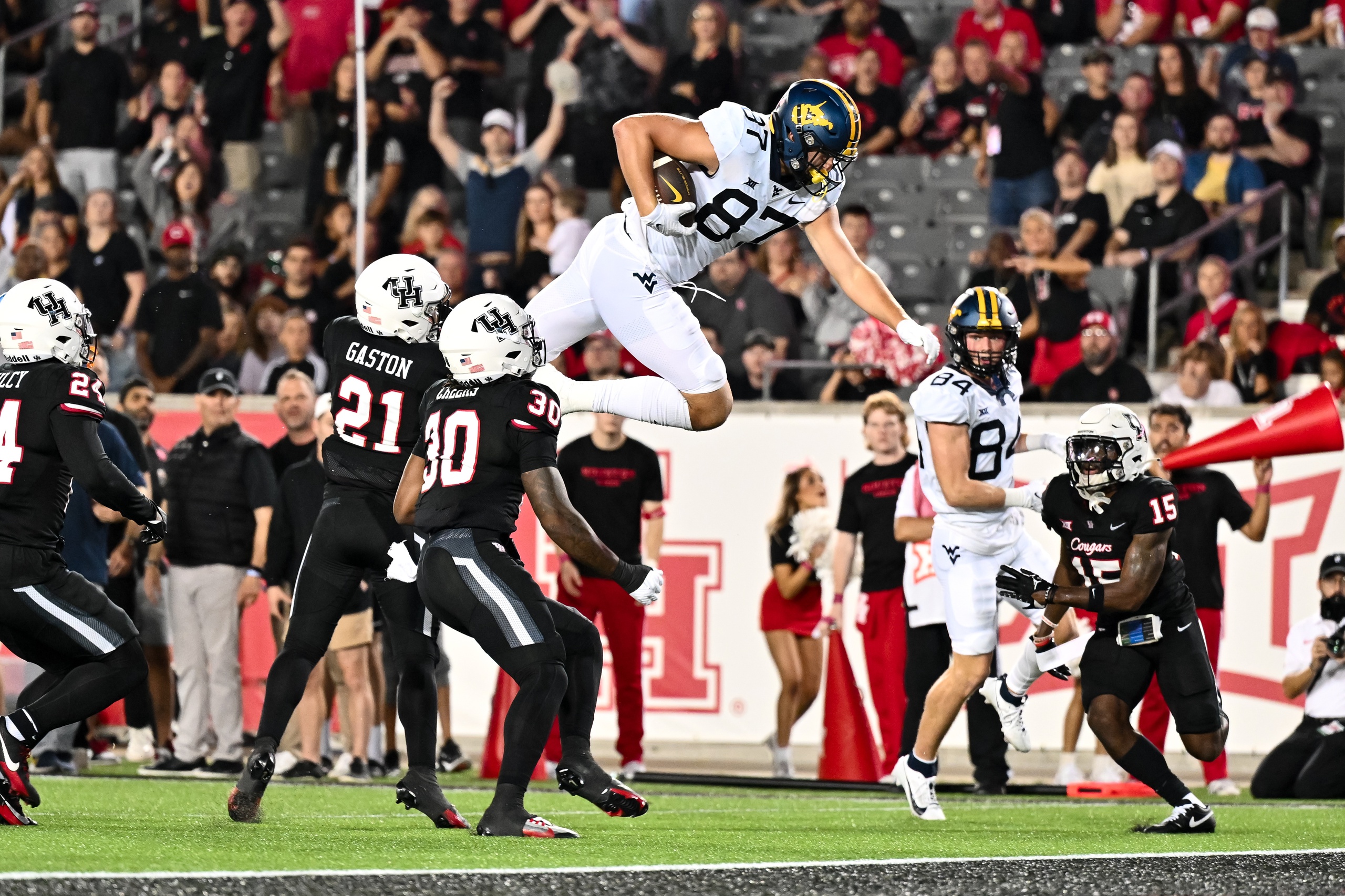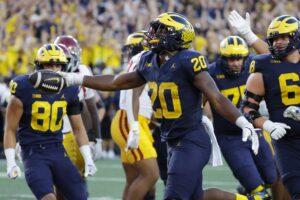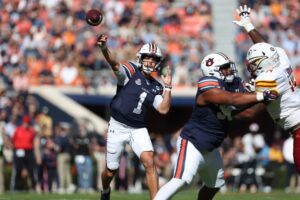As we wrote in our preview, the West Virginia Mountaineers should have taken home a win against the Houston Cougars. Honestly, that still holds true. They should have. But when push game to shove, the team could not execute the way they needed to. As a result, the Mountaineers slide against Houston and fall to 4-2 on the season.
Mountaineers Slide Against Houston
During their four-game winning streak, head coach Neal Brown had his team playing good but ugly football. Brown even lauded the fact that his team was built to win ugly football games. We talked about how the team finally started executing all the little things that needed to go right to play that type of game. A ground-and-pound clock-control game plan must be complemented by discipline, sure tackling, and great special teams. We saw Houston peel back each of those layers last night. The result was not surprising. Houston won a thriller 41-39 on a last-second Hail Mary play.
The game featured some head-scratching moments that we will analyze in turn. First, we turn to Brown’s post-game analysis of why his team lost the game. “Defensively and special teams, we did not play good enough.” He added, “Where we lost this game was discipline. That’s what’s gotten us to this point, but we were not a disciplined team tonight.” Ultimately, he said that the team did not lose on the final sequence of events that began with quarterback Garrett Greene taking off his helmet on the field after throwing for the go-ahead score with 12 seconds left on the clock. That said, he called the penalty against Greene, “A microcosm to me of the game.”
Brown is right. Disciplined football garnered the Mountaineers their 4-1 record coming into the game. The lack of discipline lost them this game. Greene’s unsportsmanlike penalty represented a lack of discipline. That lack cost West Virginia 15 yards on the ensuing kickoff. Instead of pinning Houston at their own 25-yard line, Michael Hayes had to hit a long squib that set the Cougars up at their own 43. Lack of discipline gave Houston a boxer’s chance, and they prevailed.
Lopsided Stat Sheet Overlooks the Story
On the surface, West Virginia controlled the game in some of the ways they really wanted to going into the matchup. They held the ball for nearly 37 minutes to Houston’s 23. They ran 82 plays to the Cougars’ 53. The Mountaineers piled up 546 yards to Houston’s 393. At the end of the game, nine times out of ten, when a team controls that much of the offense, they prevail. Last night was the tenth time out of ten.
West Virginia committed eight penalties for 84 yards. Houston committed seven for 70. Although slim, that represents a Houston advantage by 14 yards. Houston returned two punts for 18 yards. West Virginia returned two for just three yards. Another Houston advantage by 15 yards. Then, we look at kickoffs. Houston returned five for 184 yards and a touchdown, and West Virginia returned five for 92 yards. That gives Houston another 92 yards. All of a sudden, you add those 121 “hidden” yards into Houston’s total, and West Virginia’s yardage advantage dissipates.
Add to that the free points given on the Houston kick return and the sure touchdown mishandling that led to a third-quarter interception by Houston (the lone turnover by either team), and this tells you where Houston found the extra points. The Cougars capitalized on that interception by turning it into a touchdown.
Upon Closer Examination
The Mountaineers’ slide against Houston produced some oddities. At the end of the third quarter, Houston held a 21-17 lead. In the final quarter, the teams combined for 44 points, outpacing in a single quarter the teams’ combined production through the first three. Greene played an efficient final quarter, too, notwithstanding his penalty. Indeed, he and the receivers played well enough in that final frame to make one wonder: could the Mountaineers have played this way the whole time?
The first half certainly did not seem like it. Greene overthrew or missed wide-open receivers more than a half-dozen times. These miscues in the first half, frankly, lost the game even more than the final sequence of events. Why? Well, the Mountaineers forced Houston to punt on its opening drive. They subsequently marched 82 yards over 16 plays to kick a field goal after holding the ball for nearly eight minutes. Houston scored on the ensuing kickoff, but West Virginia then marched 69 yards over eight plays and held the ball another four minutes to recapture a 10-7 lead. At that point, Houston’s defense looked absolutely gassed.
The Cougars’ offense did not help their cause by punting after just five plays on the next drive. If Greene plays the second quarter like he did the fourth, West Virginia takes a 17-7 lead early in the second. If they play aggressively, they score on the next drive, too, after holding Houston to another short five-play drive where they held the ball for just two minutes. Then, they just ground and pound their way into full clock-control mode.
What prevented that? Penalties, miscues between quarterback and receiver, and miscues on hand-offs have been repeated mental errors under Brown’s version of the Mountaineers. They reared their heads against Houston, and instead of owning a score to show for the sheer dominance the team showed in most of the first half, they headed to the locker room down 14-10.
Work to be Done to Stop the Slide
Adding these miscues up says that Brown is right, “where we lost this game was discipline.” The Mountaineers now have a long week to prepare for Oklahoma State’s trip to Morgantown. Greene showed that he and the receivers can play football. Greene, after all, threw for a career-high 391 yards, adding 47 on the ground. He accounted for four total scores. Devin Carter had the breakout game the staff hoped he would have, catching five passes for 116 yards. Kole Taylor added 62 yards on five receptions. Hudson Clement, Traylon Ray, Preston Fox, and EJ Horton all added fuel to that fire.
This gives opposing teams plenty to think about. Maybe this team is not as one-dimensional as we thought. That said if they do not clean up the missed tackles, the drops, and the penalties, West Virginia will see plenty of heartbreaking losses. Despite good performances against Texas Tech and TCU, Houston also reminded teams that the Mountaineers still have issues in their secondary that are being magnified by injuries and depth concerns. Too many times, West Virginia has allowed a single loss to snowball into a streak of losses. To prevent the Mountaineers’ slide against Houston from becoming a trend, West Virginia has plenty of work to do.







